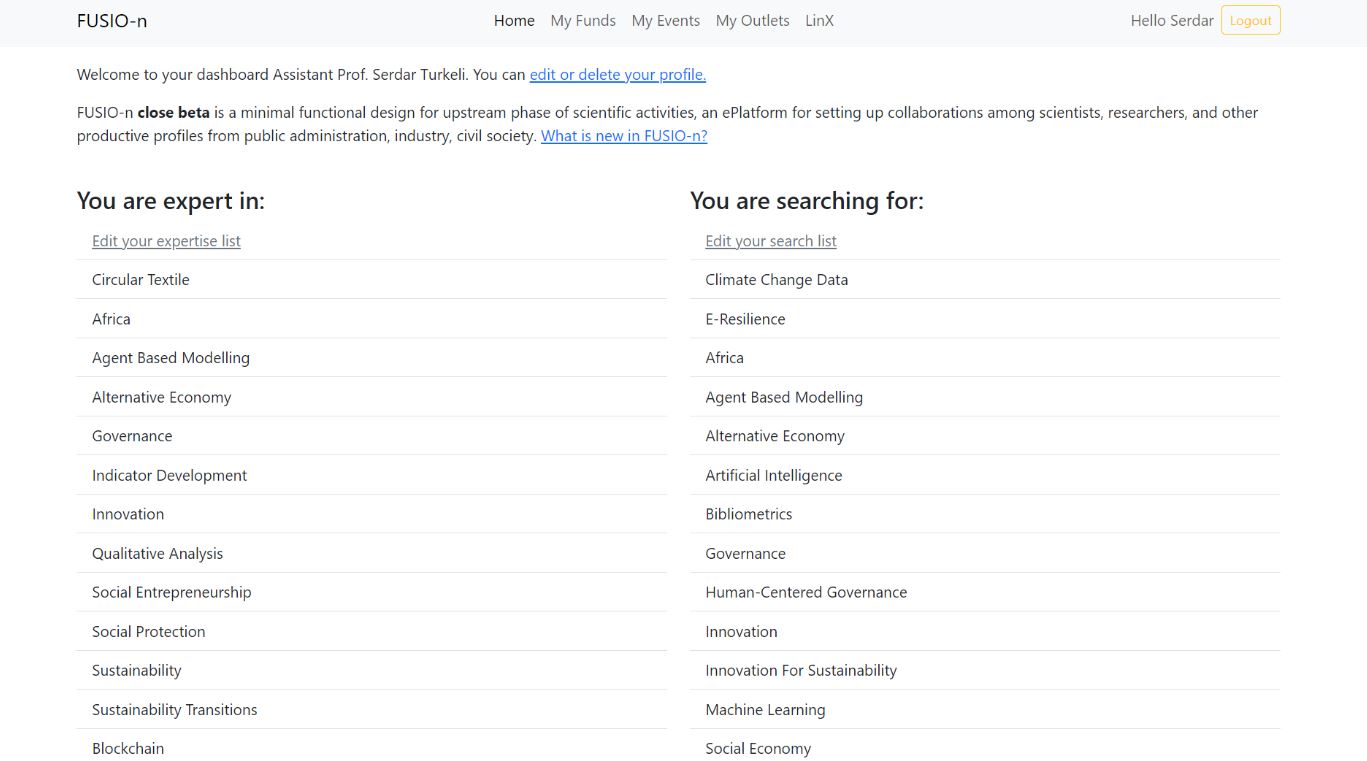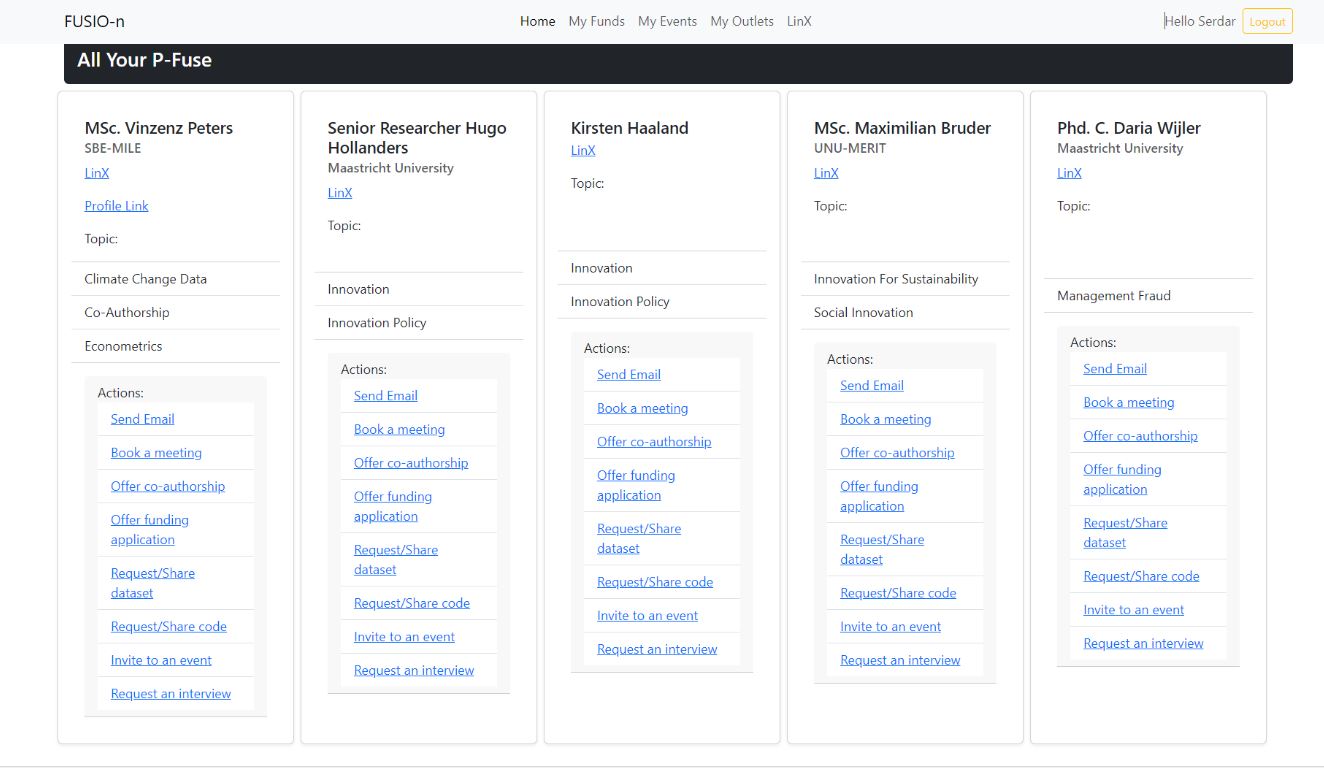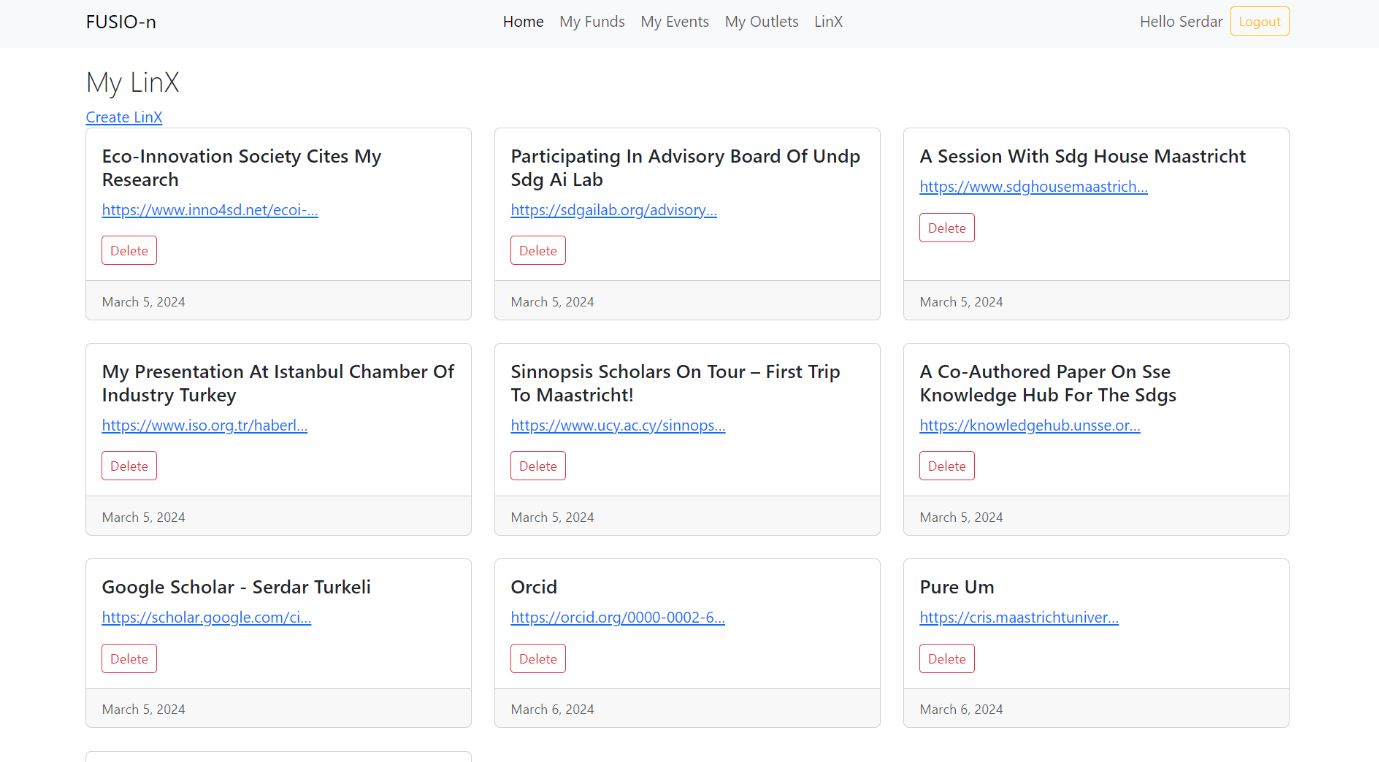FUSIO-n: An ePlatform for setting up Science-centred Research Collaborations
Digitalisation can help support facilitating setting up potential cross-departmental and societal research collaborations for science-centred research and impact creation to deal with ever-increasing complexity of societal challenges. The critique of disciplinary research silos can be corresponded by experimenting with interdisciplinary and/or transdisciplinary scientific knowledge co-creation and distribution via utilization of digitisation, digitalisation and eventually platformisation among relevant stakeholders.
What is FUSIO-n?
FUSIO-n is an ePlatform for setting up collaborations among scientists, researchers, and other productive profiles from public administration, industry, civil society. It relies on digitising expertise of researchers by using user-created and user-managed list of keywords of expertise and keywords of interests in research. Institutional profile webpages in general provide passive profiling for staff (e.g. educational and employment background, list of publications, achievements) and no actionable data and/or information on the openness and/or readiness for research-based interactions and collaborations with other parties. Open science, on the other hand, prioritizes sharing open materials such as data, code, articles, chapters, announcements (e.g., over ResearchGate, Academia.edu, LinkedIn) but not individuals per se. FUSIO-n as an ePlaform, in this regard, targets the upstream phase of scientific activities. Users self-manage their data on their expertise and interests, and can initiate team formation for co-authorships, funding applications, event organisations, and announcing call for papers and chapters.
Mining for Expertise, Funds, Events and Outlets based on Keywords
The upstream phase of scientific activities: mining expertise for collaborations are in general for finding relevant and willing experts for joint publications (e.g., co-authorship, augmenting and/or complementary assets, such as skills); joint funding applications (e.g., team formation, team science, collective grants, consortium formation); joint events (e.g., organisation of ideation sessions, reading groups, research conversations, community building activities, conferences, workshops). There are many barriers to setting up such collaborations, e.g. disciplinary, financial, social barriers but also the lack of data, information about already existing possibilities, so the potential to experiment also exists. Thus, the main functions of FUSIO-n ePlatform extends from Users to Funds, Events (e.g. conferences, workshops), Outlets and Links.
FUSIO-n concentrates on this self-organising, bottom-up potential by digitising the expertise and interests via keywords. Researchers use keywords for their thematic, theoretical, conceptual, methodological expertise and research interests for prospective funding applications, events and outlets. The lists of such keywords can extend and/or shrink, so it is dynamic, and they enable us to detect next funding opportunities, among other opportunities such as participating in relevant events, and publication in various outlets. Likewise, they help us to find relevant and willing experts for co-authorship, research team/consortium formation, event co-organisation. If we digitise our key expertise and research interests, we may also benefit from this in the era of digitalisation with Natural Language Processing (NLP), Artificial Intelligence (AI), Machine Learning (ML), and Large Language Models (LLMs). FUSIO-n intends extending to such services for users in the upcoming year, 2025.

The Minimal Functional Design: FUSIO-n
Maastricht Observatory on Resilient, Responsible and Sustainable Enterprise and Economy (MORSE) has three overarching themes: Resilience, Responsibility, and Sustainability. These main themes are further divided into ten sub-themes. As a sub-theme “Resilient, Responsible and Sustainable Initiatives Observatory” (MORSE IO) database consists of academic members from various SBE departments and local organisations active in Maastricht. In 2024, FUSIO-n is designed and implemented for MORSE members and other external stakeholders. Currently, FUSIO-n has more than 40 users from various UM SBE departments and is about to be opened to external stakeholders in the local ecosystem.

Other than mining and/or creating collaboration announcements for funding applications, events, and outlets, LinX repository provides users a digital space for collecting users’ external links/recognition at other sites and close/open scientific assets (e.g. Researchgate, GitHub), all external links, in one page.

Overall, FUSIO-n intends to fuel the forefront of scientific exploration by paving a digital and social way in forming innovative research teams and trajectories, and fostering a collaborative team science environment that embraces diverse academic and societal expertise, and perspectives. A user and data-driven digital infrastructure and platform in the making that is complementary to social academic interactions within academia and with external stakeholders.
Links
FUSIO-n
How FUSIO-n works (pdf)
Also read
-
Rethinking Higher Education in an AGI World: Reflections from the MINDS Workshop
With artificial intelligence (AI) developing at a rapid pace, conversations around its future impact are becoming increasingly urgent. While artificial general intelligence (AGI) — systems that could rival or exceed human-level performance across tasks — remains a highly debated concept, it cannot...

-
Discrimination makes women want to work less
Recent research by scientists at Maastricht University in the Netherlands and Aarhus University in Denmark shines a new light on the gender pay gap. Discrimination makes women want to work fewer hours.

-
ICC@M at Maastricht University: competing with the best, shaping the future
Roy Broersma, Academic Director of ICC@M, bridges academia and business, enhancing Maastricht University’s impact. He aims to strengthen regional ties, foster bold ideas, and prepare students for real-world challenges.
